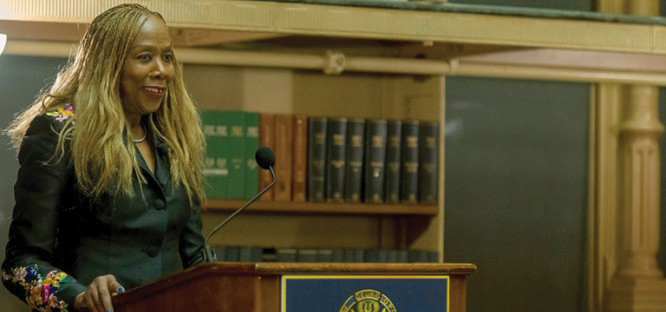Georgetown plans to roll out its first Cultural Climate Survey to gauge inclusivity and diversity on campus, according to the Office of Institutional Diversity, Equity & Affirmative Action.
The Cultural Climate Survey is set to examine an array of identity and diversity distinctions, including race, ethnicity, faith, sexuality, ability, gender identity and other backgrounds, according to Rosemary Kilkenny, vice president for Institutional Diversity and Equity.
The Coalition on Racial and Cultural Inclusivity is currently collaborating with IDEAA on the Cultural Climate Survey, according to Uju Nwaigwe (COL ’20), chair of the Georgetown University Student Association Coalition on Racial and Cultural Inclusivity. The coalition was planning to administer its own racial climate survey before IDEAA announced plans to develop the Cultural Climate Survey.

Nwaigwe said that she hopes the survey will resemble the Sexual Assault and Misconduct Climate Survey.
“I hope the survey also speaks to various situations, such as what it is it like to be a queer POC on campus or what is the experiences of students of color in classrooms,” Nwaigwe wrote in an email to The Hoya.
The university is committed to using the survey as a tool for identifying areas of concern related to policies, practices and resources, Kilkenny said.
“As a Catholic and Jesuit university, we are committed to fostering a welcoming and inclusive campus and always working to improve our institutional policies and programs,” Kilkenny wrote in a statement to The Hoya.
Similar climate surveys have been administered at a number of other universities. The University of Michigan administered the Campus Climate Survey on Diversity, Equity and Inclusion in 2016. The Office for Inclusion, Diversity and Equal Opportunity at Case Western University administered the Diversity Climate Survey in 2011.
Discussions between university leaders and the Georgetown community regarding the details of the Cultural Climate Survey are ongoing, and IDEAA has not yet established a timeline for the survey.
The Cultural Climate Survey can help bring attention to discrimination issues on campus, according to Nwaigwe.
“As a person of color, there is no number to the amount of times that I have been discriminated on this campus,” Nwaigwe wrote. “My decision to make this climate survey happen was to create data to strengthen my arguments that racism and discrimination are prevalent on Georgetown’s campus.”
Georgetown administered its inaugural Sexual Assault and Misconduct Climate Survey in 2016 to assess the prevalence of sexual misconduct on campus. In the 2016 survey, 31 percent of female undergraduates who answered the survey and 10.8 percent of male undergraduates respondents reported experiencing nonconsensual sexual contact on campus. Over 7,900 undergraduate and graduate students participated in the survey.
The second Sexual Assault and Misconduct Climate Survey is currently taking place. The survey opened Feb. 1 and is set to close Friday. Over 5,000 students have participated in the survey thus far, according to Kilkenny.
As a result of the Cultural Climate Survey, a broad spectrum of identities can be heard, according to Kendell Long (COL ’19), resident director of the Black House.
“One identity doesn’t take the backseat to another,” Long said. “All are covered in a very intentional and with a great level of depth.”
Having statistics that prove the prevalence of discrimination on campus may pressure the university to take action, Long said.
“The Cultural Climate Survey will be able to hear the hard and undebatable data based on student experiences,” Long said. “I think it is somewhat disheartening that it takes numbers and data to do this rather than student experiences, but I am hopeful for the impact it can have on campus.”




















